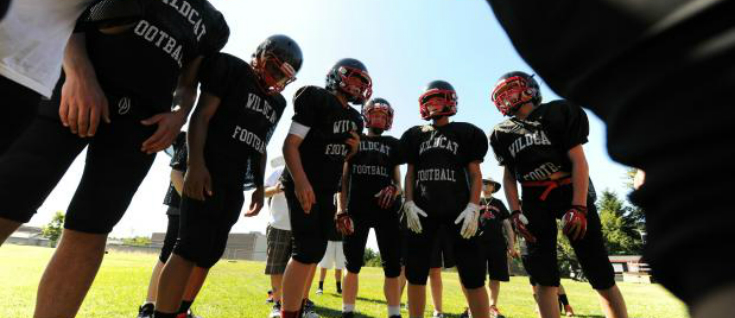The secret sauce: 7 ingredients for a winning season

Some teams have it, and you know you’re in for a tough battle. They’ll challenge you, play with enthusiasm and never give up. Even if they lose, they play like winners.
Other teams don’t have it, and it shows. Their players might be talented, and they might have a fun football season, but something is missing.
What is it?
What’s that secret sauce that turns a football season into an amazing season? What makes a season the one players’ parents talk about for years? The secret sauce is creating and maintaining a strong team spirit, or as the French would say, espirit de corps. Merriam-Webster defines espirit de corps as “the common spirit existing in the members of a group inspiring enthusiasm, devotion and strong regard for the honor of the group.”
How does a team develop the secret sauce? Here are the seven key ingredients.
- The coach embraces a teaching role. The primary role of coaching at the youth level isn’t to develop the best winning percentage or to point out referee’s errors from the sidelines. No, youth coaching is about player development. You see, you’re not just trying to get players to perform for your next games, but you’re preparing them for future seasons. Great coaches are great teachers. To be able to teach somebody, you really need to know your stuff. One of the biggest challenges for coaches is balancing the need for repetitions in practice to get players to learn techniques and assignments with the fact that repetition can get boring quickly. The “Drill and Kill” teaching technique is not high on most peoples’ lists for enjoyable ways to learn. When kids are not learning, they get bored. And when players are bored, they look for alternatives. Be creative. Introduce competitive games. Switch activities and drills quickly. Keep it fresh.
- Build trust. To inspire and lead people, coaches need to be trusted by their players. The best coaches are credible and fair. They treat players like they’d want to be treated. They don’t let the whistles around their necks cut off the air supply to their brains. They don’t coach with fear. At practices and beyond, smart coaches employ team-building exercises. It might mean eating out together as a team or watching an inspirational football movie together.
- A preparation emphasis. Practice time is king! Practices are like class sessions in school, and game days are similar to test days. Games assess how far your team has progressed. The real work and progress happens during class sessions – practices. I always worry for coaches who spend more time preparing line-up variations for game days than they do preparing their agendas for practices. There’s a lot to teach your players, so coaches need to come prepared with what they hope to cover and how. Coaches shouldn’t wing it. Go to clinics, watch YouTube videos to review how other coaches teach concepts and talk to other coaches. Be ready. Also, players should come prepared to give their best for practices and games.
- Coaches connect with players. You don’t need talk teen speak like a “Modern Family’s” Phil Dunphy might try, but coaches should connect with their teams by understanding the audience. What team drills and activities are team favorites? How should you handle players with different temperaments? Which players on the team might need more time or additional coaching when introducing new techniques? Also, let players know you’re not just all about football, that you’re interested in them as people.
- Players buy into program. The strongest teams usually have strong team leaders. On any team, there might be one player, or for some teams maybe a handful of players, who can set the tone for the entire team. Don’t underestimate the strength of connecting with them. If you get buy-in from those players, you’ll likely get buy-in from the whole team.
- Effective communication. This starts with the head coach. Coaches need to budget time to prepare communication for players, assistant coaches and team parents. Coaches need to create an environment in which players feel comfortable asking questions and speaking openly. Players need to ask questions when they have them. Players and coaches need to address issues before they become problems. Communicate frequently and set expectations for roles early in the season. What do you expect your assistants to do, your players, your players’ parents, etc.
- Make if fun! This is a joint effort between coaches and players, but since the coach controls the agenda, it must start there. Throughout the season, they’ll be plenty occasions for spontaneous fun, but the best coaches plan for it. Solicit ideas from players, team leaders and assistant coaches for ways to make practices and the season more enjoyable. Consider themed practices, contests, competitions, occasional treats, joint scrimmages with other teams and player-parent involvement. Plan your fun. As the season progresses, you’ll have more time to schedule in some fun activities that will coincide with the time when players need it the most. For many players, some of these lighter moments will be the most memorable events of the season.
Michael O’Halloran When not reviewing ALS Ice Bucket Challenges videos, he works writing inspirational sports stories for Sports Feel Good Stories.com. For coaching practice plans, offseason workouts, sports trivia games and award certificate templates for football, baseball, basketball, softball and volleyball, check out the SportsFeelGoodStories Store.
